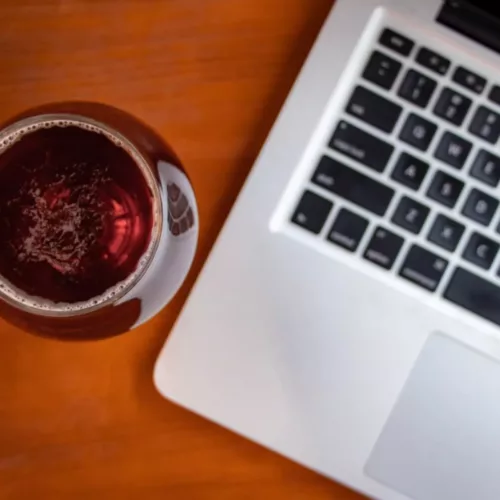How to identify if your workplace has an unhealthy drinking culture

3 Minute Read
Every country has its own drinking guidelines. Canada publishes its own under Canada’s Guidance on Alcohol and Health by the Canadian Centre on Substance Abuse and Addiction to inform what is acceptable drinking limits for low-risk alcohol use.
Socializing over alcohol is one of the most common social activities in Canada. As a legal drug, it has found its way into workplaces as well. A drink during a Friday meeting, drinks after work, happy hours and wine nights have all become popular ways of keeping employees engaged and connected. But, is your workplace contributing to a drinking culture that is unhealthy?
Here are some indicators that it may be so:
Having all company-wide celebrations center around alcohol
Companies celebrate closing of funding rounds, awards and achievements, employee birthdays, holidays, revenue milestones, promotions, and more. There is always something to celebrate, especially when it can also be a great vehicle to boost employee morale. Making alcohol the primary way for celebrations may promote an unhealthy drinking culture as it not only affects employee health, but may also alienate employees who do not drink. Peer pressure may also become a factor if employees feel obliged to drink to be representative of the company culture.
Normalizing drinking as a coping mechanism
A recent CBC article has named using drinking as a coping mechanism as the “wine-to-unwind culture” where people use alcohol as a reward to get through the day. Meme culture and social media contribute to normalizing drinking to unwind as a way to cope with every day stressors. Your employees are exposed to this culture daily. With stress, anxiety and depression on the rise due to the pandemic and now, post-pandemic life and economic instability, if this culture is reinforced within your organization, it may be creating a perfect storm.
Effects of work stress and long hours
This is another angle on how your workplace culture may be affecting drinking. According to an article by the Harvard Business Review, people who work long hours are likelier to have health problems including impaired sleep, depression, heavy drinking and impaired memory. This eventually hurts the organization’s bottom line as it starts causing absenteeism, turnover and rising health insurance costs. There is no evidence that alcohol consumption causes all of this on its own, but it is important to remember that it does become a coping mechanism and it can be a contributing factor.
How can you create the right balance between being social while encouraging a healthy drinking culture?
Create awareness
How many of your employees know the acceptable limits for consumption and alcohol’s negative effects? How many of them are aware that using alcohol as a coping mechanism is getting normalized by social media and thus affecting a negative change in behaviour? Providing content and resources to promote healthy drinking behaviour is the first step to creating a healthy drinking culture in the workplace.
Make sure your company events aren’t always centered around alcohol
Even if employees are welcome to consume alcohol during meetings, events and celebrations, make sure the focus is not alcohol itself. This can be as simple as taking the focus away from alcohol and making sure the event is not called a “happy hour” or “drinks”. Including mocktails or other food items in the celebration can also make everyone feel included while taking the focus away from alcohol.
Build a resilient workforce
Employees may turn to alcohol as a coping mechanism if they are feeling stressed, anxious or depressed. Creating mental health awareness and destigmatizing getting help is the first step to creating a resilient workforce. Also reviewing the workplace culture and providing employees with the tools to cope can help with achieving and maintaining a healthy drinking culture.
Establish ground rules for work from home
As more companies choose to offer remote work as an option long-term, companies need to work with HR teams to establish ground rules. A policy statement on work from home policies encapsulating alcohol use can discourage employees from drinking at work hours. This can be further reinforced by educating leadership, investing in remote work training as well as having an open communication with employees to get their buy-in.
Kii Health’s health and wellness platform Kii, by Kii Health provides organizations with Employee Assistance, Mental Health Supports, Medical Care, Disability Management, Occupational Health & Safety and Digital Health Education. It’s all accessible through one, connected program with a highly skilled nurse to help employees navigate the full spectrum. Connect with us to bring this innovative program to your organization.
Most Read Articles

Reducing Burnout in the Workplace is Possible with These Tips
Read article
INFOGRAPHIC: 2023 Canadian Workplace Health Benefits – Perceptions & Utilization
View infographic